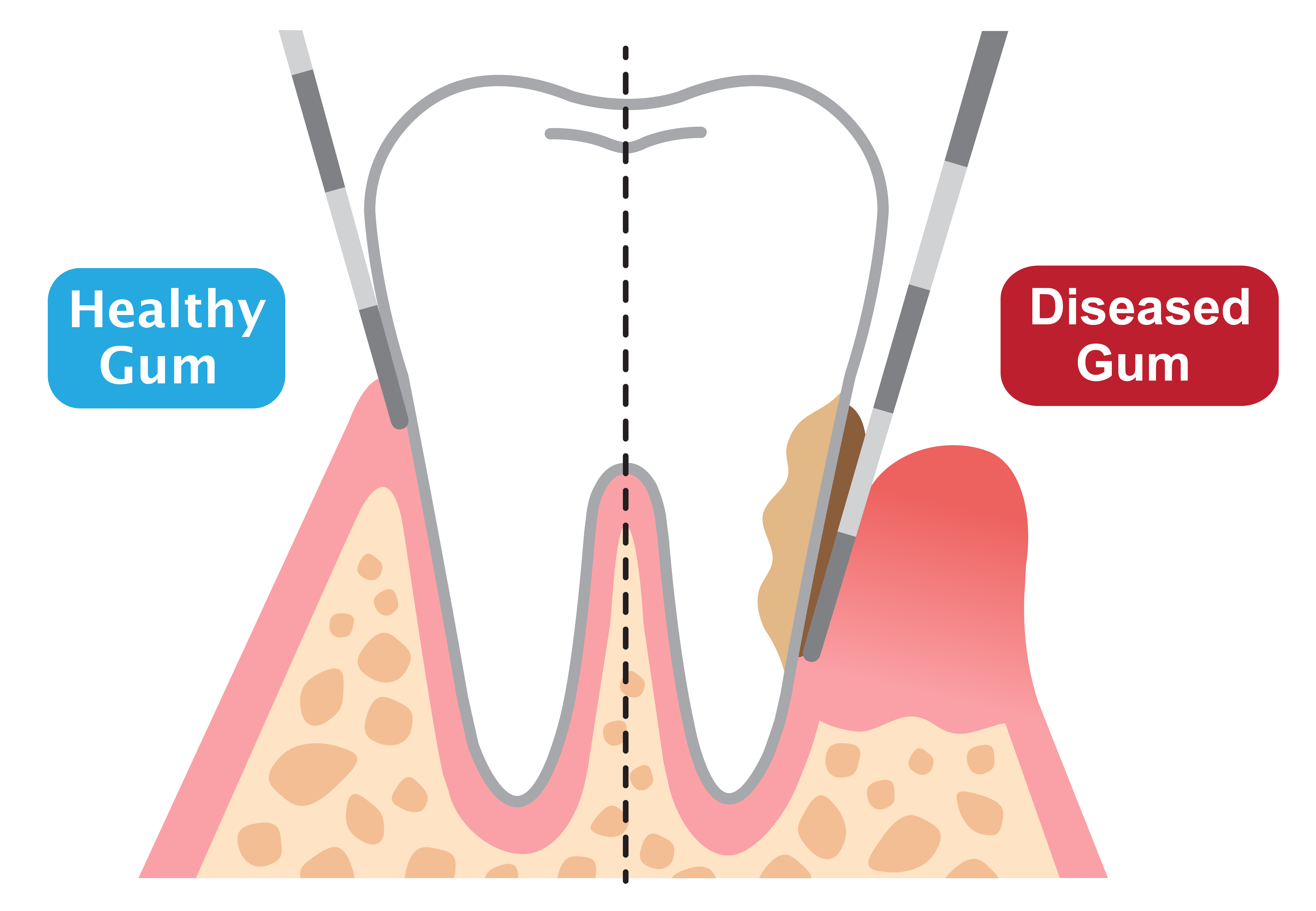
Periodontal Treatment
Our dentist and dental team are committed to preventing and treating periodontal disease, also known as gum disease. Periodontal disease is a degenerative condition caused by the accumulation of plaque and calculus on the teeth and gums. When left untreated, periodontal disease can lead to tooth loss, gum loss, and bone loss. In severe cases, periodontal disease has also been linked to serious health problems such as heart disease, stroke, diabetes, and pregnancy complications. Your Lehi, Utah dentist, Dr. Dorny, may recommend a periodontal treatment such as scaling and root planing (a deep-cleaning method) to improve the health of your teeth and gums. If your gums are red, swollen, or bleed easily, you may have periodontal disease. We encourage you to contact us at Aspen Heights Dental today to schedule your consultation. Your health is our top priority!
It’s no secret that keeping your teeth in good condition is essential to maintaining a healthy smile and lifestyle for many years. You may be surprised to learn that caring for your gums is equally important. Healthy gums play a critical role in good oral and overall health. While caring for your gums is essential, it’s also simple with the help of the trusted dental team at Aspen Heights Dental. Here’s what you should know about preventing, diagnosing, and treating periodontal disease, as well as maintaining strong gums for a lifetime.
What Is Periodontal Disease?
Periodontal disease, commonly referred to as gum disease, occurs when a person’s gums become infected. Gum disease is relatively common and can often develop and progress without any noticeable signs or symptoms. For most people, gum disease results from poor oral hygiene habits. When a person doesn’t brush or floss their teeth every day, food particles and bacteria can build up in their tooth’s crevices and their gum line. As a result, sticky plaque forms, which is virtually impossible to remove with routine at-home brushing. This plaque will eventually harden into tartar if not removed with the help of professional teeth cleaning at the dentist, and from there, resulting in gum disease.
Plaque begins as a translucent film that is difficult to see to the naked eye and can’t be removed with normal brushing at home. It can lead to gingivitis at the beginning, which causes the gums to bleed, turn red, and swell. If not treated, gingivitis can quickly progress into periodontitis, which leads the pockets of gums around the tooth to pull away and can eventually lead to loose teeth or tooth loss.
Most people who have gum disease aren’t aware of it until a dentist diagnoses them. While this is true, common signs of gum disease include:
- Bad breath
- Inflamed gums
- Bleeding gums
- Tender or sensitive gums
- Loose or missing teeth
- Discomfort when eating
What Happens If Periodontal Disease Goes Untreated?
Unfortunately, oral health issues will not resolve on their own. In fact, they will most likely get worse, become more painful, and cost more money to correct if left untreated for an extended period of time. Because of this, it’s very important to seek treatment as soon as you notice one or more of the symptoms of gum disease and visit the dentist regularly for bi-annual exams and cleanings.
Diagnosis and Gum Treatment
Gum disease is diagnosed through an oral examination performed by a dentist. The dentist will look for signs of infection and/or inflammation of your gum, as well as to measure the “pockets” of your gums that surround each of your teeth. Healthy gums should fit snugly around your teeth, attaching to them one to three millimeters below the gum line. For individuals with gum disease, however, these pockets become loose and gradually wear away over time. This can eventually lead to a number of dental problems, including loose teeth or even potential tooth loss.
If your dentist diagnoses you with gum disease, he will create a personalized treatment plan to help restore your oral health as quickly as possible. He may recommend that you have a professional deep cleaning performed. Deep cleanings work in the same way that routine cleanings do in removing the plaque and tartar from the surface of one’s teeth, but they take this process even further. The dental hygienist will pay special attention to your gum line and the pockets that surround your teeth. She will use a special instrument to scale and plane your teeth’ crowns and roots to thoroughly clean and restore them to health. The length of this process usually takes about an hour but could be longer or shorter depending on the condition of your gums.
Gum Health Is Essential to Overall Health
Gum disease can certainly be detrimental to a person’s oral health, but it can also negatively impact other parts of their body. Untreated gum disease can cause your immune system to work harder than usual, striving to fight off things that it typically wouldn’t have to. In some cases, this can lead to autoimmune disorders where your body starts fighting healthy cells. Likewise, the bacteria that live in infected gums have the ability to travel throughout your body through your blood. This can lead to serious health conditions, including a heart attack or stroke.
How to Prevent Gum Disease
Gum disease can be uncomfortable and inconvenient, but the good news is that it is preventable. The best way to keep your teeth and gums in good condition is to practice excellent oral hygiene habits at home on a consistent basis. Keeping your gums healthy is as simple as:
- Brushing your teeth with an electric toothbrush for two minutes twice a day
- Floss and use mouthwash daily
- Eat foods with vitamin C that can help reduce inflammation and fight infection
- Drink plenty of water, particularly when eating acidic or sugary foods that can harm your gums and teeth
- Avoid foods that are hard to remove from your teeth, such as sweets and soda
- Visit the dentist every six months for regular check-ups and professional cleanings
Not practicing good oral health habits at home can lead to more than merely bad breath. Periodontal disease is a serious dental issue that can go from bad to worse in a short period of time. Fortunately, there are practical steps you can take to proactively care for your oral and overall health. Brushing, flossing, routine dental exams, and professional cleanings can go a long way in keeping your teeth and gums healthy and strong for a lifetime.
If you are exhibiting one or more symptoms of gum disease, or if you can’t remember the last time you visited the dentist, Aspen Heights Dental is here to help you prioritize your oral health. Contact us today to schedule an appointment with our friendly dental team. We can’t wait to give you a reason to smile bright!
